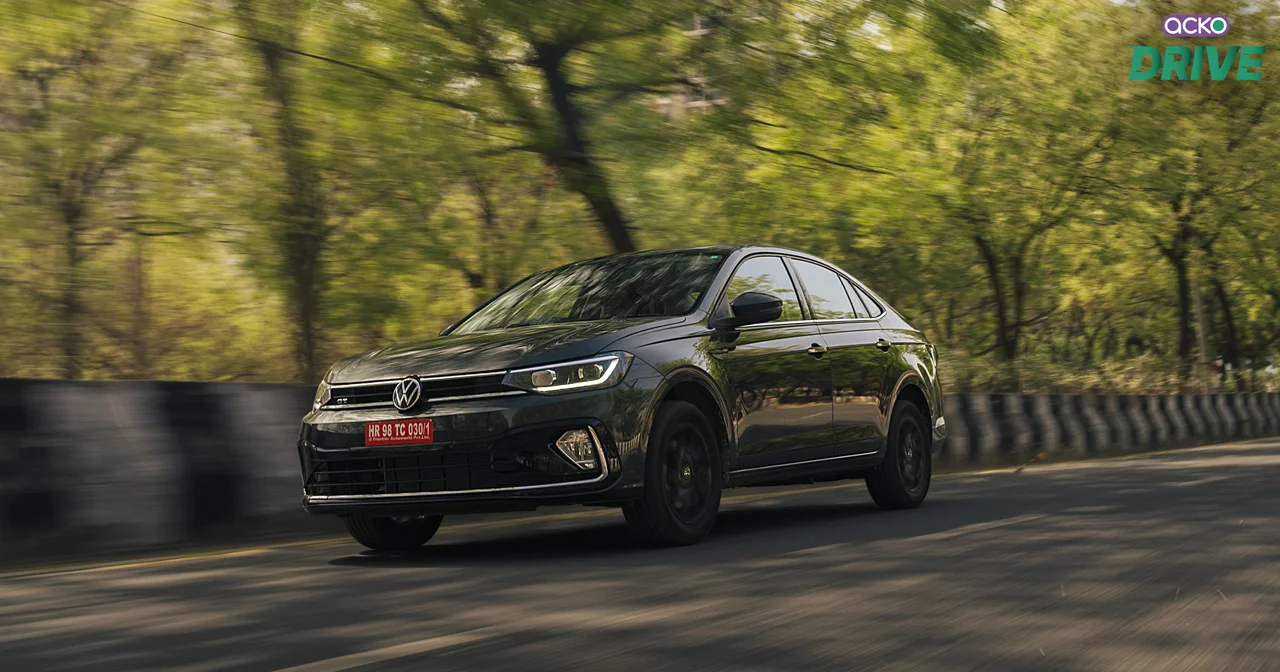What is the mileage of Volkswagen Virtus?
The Volkswagen Virtus offers different mileage figures depending on the fuel type and transmission. The manual petrol variant delivers up to 20 km/l, while the automatic petrol variant offers up to 19 km/l.


18 - 20 kmpl
Petrol Mileage
Manual
20 kmpl
Automatic
19 kmpl
1.0 Comfortline
19 kmpl
Petrol • Manual
ARAI mileage
Monthly Fuel cost for 40km/day₹5,985
1.0 Highline
19 kmpl
Petrol • Manual
ARAI mileage
Monthly Fuel cost for 40km/day₹5,985
1.0 Highline Plus
20 kmpl
Petrol • Manual
ARAI mileage
Monthly Fuel cost for 40km/day₹5,686
1.0 GT Line
20 kmpl
Petrol • Manual
ARAI mileage
Monthly Fuel cost for 40km/day₹5,686
1.0 Topline
19 kmpl
Petrol • Manual
ARAI mileage
Monthly Fuel cost for 40km/day₹5,985
1.5 GT Plus
18 kmpl
Petrol • Manual
ARAI mileage
Monthly Fuel cost for 40km/day₹6,318
1.5 GT Plus Sport
18 kmpl
Petrol • Manual
ARAI mileage
Monthly Fuel cost for 40km/day₹6,318
1.5 GT Plus Edge Black
18 kmpl
Petrol • Manual
ARAI mileage
Monthly Fuel cost for 40km/day₹6,318
Petrol • Manual
ARAI mileage
Monthly Fuel cost for 40km/day₹5,985
1.0 Topline (Sound Edition)
19 kmpl
Petrol • Manual
ARAI mileage
Monthly Fuel cost for 40km/day₹5,985
Petrol • Manual
ARAI mileage
Monthly Fuel cost for 40km/day₹6,318
Petrol • Manual
ARAI mileage
Monthly Fuel cost for 40km/day₹6,318
Petrol • Manual
ARAI mileage
Monthly Fuel cost for 40km/day₹6,318
1.5 GT Plus Edge DSG Black
19 kmpl
Petrol • Manual
ARAI mileage
Monthly Fuel cost for 40km/day₹5,985
1.0 Highline AT
18 kmpl
Petrol • Automatic
ARAI mileage
Monthly Fuel cost for 40km/day₹6,318
1.0 Highline Plus AT
18 kmpl
Petrol • Automatic
ARAI mileage
Monthly Fuel cost for 40km/day₹6,318
1.0 GT Line AT
18 kmpl
Petrol • Automatic
ARAI mileage
Monthly Fuel cost for 40km/day₹6,318
1.0 Topline AT
18 kmpl
Petrol • Automatic
ARAI mileage
Monthly Fuel cost for 40km/day₹6,318
1.5 GT Plus DSG
19 kmpl
Petrol • Automatic
ARAI mileage
Monthly Fuel cost for 40km/day₹5,985
1.5 GT Plus Sport DSG
19 kmpl
Petrol • Automatic
ARAI mileage
Monthly Fuel cost for 40km/day₹5,985
Petrol • Automatic
ARAI mileage
Monthly Fuel cost for 40km/day₹6,318
1.5 GT DSG
19 kmpl
Petrol • Automatic
ARAI mileage
Monthly Fuel cost for 40km/day₹5,985
Petrol • Automatic
ARAI mileage
Monthly Fuel cost for 40km/day₹6,318
Petrol • Automatic
ARAI mileage
Monthly Fuel cost for 40km/day₹6,318
Petrol • Automatic
ARAI mileage
Monthly Fuel cost for 40km/day₹5,985
Petrol • Automatic
ARAI mileage
Monthly Fuel cost for 40km/day₹5,985
Maintain your Volkswagen Virtus in top-notch condition by regularly servicing the vehicle.
Be gentle with the accelerator pedal, and avoid sudden acceleration.
Maintain the optimum tyre pressure in your Volkswagen Virtus.
Maintain your Volkswagen Virtus in top-notch condition by regularly servicing the vehicle.
Be gentle with the accelerator pedal, and avoid sudden acceleration.
The Volkswagen Virtus offers different mileage figures depending on the fuel type and transmission. The manual petrol variant delivers up to 20 km/l, while the automatic petrol variant offers up to 19 km/l.
The Volkswagen Virtus delivers excellent fuel efficiency in city conditions. The manual petrol variant achieves up to 20 km/l, while the automatic petrol variant delivers up to 19 km/l under typical city driving conditions.
The Volkswagen Virtus manual transmission offers up to 20 km/l, while the automatic transmission delivers up to 19 km/l. The difference is minimal, making both options fuel-efficient choices.
The mileage of Volkswagen Virtus can be affected by various factors including driving conditions, traffic patterns, vehicle maintenance, tire pressure, and driving style. Under optimal conditions, you can achieve up to 20 km/l with manual transmission and 19 km/l with automatic transmission.
Yes, the Volkswagen Virtus is quite fuel efficient. It delivers up to 20 km/l with manual transmission and 19 km/l with automatic transmission, making it an economical choice for daily commuting.
Discover. Decide. Drive.
Explore at your pace, with expert recommendations if needed. Finalise and book your car at the best price.
Financing the right way
Access the best loan options with hassle-free, paperless financing.
Prepare to drive
Schedule delivery for your special day and track updates effortlessly.Schedule delivery for your special day and track updates effortlessly.